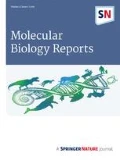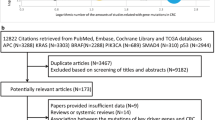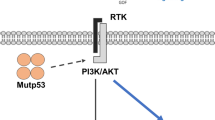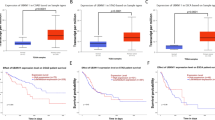Abstract
Background
Metastasis is a major cause of death in Colorectal cancer (CRC) patients, and the Epithelial–mesenchymal transition (EMT) has been known to be a crucial event in cancer metastasis. Downregulated expression of AT-rich interaction domain-containing protein 1A (ARID1A), a bona fide tumor suppressor gene, plays an important role in promoting EMT and CRC metastasis, but the underlying molecular mechanisms remain poorly understood. Here, we evaluated the impact of ARID1A knockdown and overexpression on the expression of EMT‑related genes, E-cadherin and β-catenin, in human CRC cells.
Methods and results
The expression levels of ARID1A, E-cadherin and β-catenin in CRC cell lines were detected via real-time quantitative PCR (qPCR) and western blot. ARID1A overexpression and shRNA-mediated knockdown were performed to indicate the effect of ARID1A expression on E-cadherin and β-catenin expression in CRC cell lines. The effect of ARID1A knockdown on the migration ability of HCT116 cells was assessed using wound-healing assay. We found that the mRNA and protein expression of adhesive protein E-cadherin was remarkably downregulated in response to shRNA-mediated ARID1A knockdown in HCT116 and HT29 cells. Conversely, overexpression of ARID1A in SW48 cells significantly increased E-cadherin expression. In addition, ARID1A silencing promoted the migration of HCT116 cells. ARID1A knockdown and overexpression did not alter the level of β-catenin expression.
Conclusions
Our study demonstrates that E-cadherin levels were closely correlated with ARID1A expression. Thus, ARID1A downregulation may promote CRC metastasis through decreasing EMT‑related protein E-cadherin and promoting epithelial cell movement. ARID1A could represent a promising candidate therapeutic target for CRC.



Similar content being viewed by others
Data availability
All data are included in this article and datasets used and/or analyzed during the current study are available from the corresponding author on reasonable request.
References
Bray F et al (2018) Global cancer statistics 2018: GLOBOCAN estimates of incidence and mortality worldwide for 36 cancers in 185 countries. CA Cancer J Clin 68(6):394–424
Siegel RL et al (2020) Colorectal cancer statistics, 2020. CA Cancer J Clin 70(3):145–164
Kranenburg O, Speeten KVD, Hingh ID (2021) Peritoneal metastases from colorectal cancer: defining and addressing the challenges. Front Oncol 11:639
Filip S et al (2020) Distant metastasis in colorectal cancer patients—do we have new predicting clinicopathological and molecular biomarkers? A comprehensive review. Int J Mol Sci 21(15):5255
Mathur R (2018) ARID1A loss in cancer: towards a mechanistic understanding. Pharmacol Ther 190:15–23
Mathur R et al (2017) ARID1A loss impairs enhancer-mediated gene regulation and drives colon cancer in mice. Nat Genet 49(2):296
Jones S et al (2012) Somatic mutations in the chromatin remodeling gene ARID1A occur in several tumor types. Hum Mutat 33(1):100–103
Network CGA (2012) Comprehensive molecular characterization of human colon and rectal cancer. Nature 487(7407):330
Erfani M et al (2020) Altered ARID1A expression in colorectal cancer. BMC Cancer 20:1–13
Kishida Y et al (2019) Associations between loss of ARID1A expression and clinicopathologic and genetic variables in T1 early colorectal cancer. Am J Clin Pathol 152(4):463–470
Somsuan K et al (2019) ARID1A knockdown triggers epithelial-mesenchymal transition and carcinogenesis features of renal cells: role in renal cell carcinoma. FASEB J 33(11):12226–12239
Wang T et al (2020) Role of ARID1A in epithelial-mesenchymal transition in breast cancer and its effect on cell sensitivity to 5-FU. Int J Mol Med 46(5):1683–1694
Yan H-B et al (2014) Reduced expression of the chromatin remodeling gene ARID1A enhances gastric cancer cell migration and invasion via downregulation of E-cadherin transcription. Carcinogenesis 35(4):867–876
Wang W et al (2019) ARID1A, a SWI/SNF subunit, is critical to acinar cell homeostasis and regeneration and is a barrier to transformation and epithelial-mesenchymal transition in the pancreas. Gut 68(7):1245–1258
Ramirez Moreno M, Stempor PA, Bulgakova NA (2021) Interactions and feedbacks in E-cadherin transcriptional regulation. Front Cell Dev Biol 9:1685
Brabletz T et al (2018) EMT in cancer. Nat Rev Cancer 18(2):128–134
Pastushenko I, Blanpain C (2019) EMT transition states during tumor progression and metastasis. Trends Cell Biol 29(3):212–226
Kuroda H et al (2009) Simplified lentivirus vector production in protein-free media using polyethylenimine-mediated transfection. J Virol Methods 157(2):113–121
Vu T, Datta P (2017) Regulation of EMT in colorectal cancer: a culprit in metastasis. Cancers 9:171
Ramesh V, Brabletz T, Ceppi P (2020) Targeting EMT in cancer with repurposed metabolic inhibitors. Trends Cancer 6(11):942
Loh C-Y et al (2019) The E-cadherin and N-cadherin switch in epithelial-to-mesenchymal transition: signaling, therapeutic implications, and challenges. Cells 8(10):1118
Druzhkova I et al (2019) E-cadherin in colorectal cancer: relation to chemosensitivity. Clin Colorectal Cancer 18(1):e74–e86
Yang Y et al (2019) Loss of ARID1A promotes proliferation, migration and invasion via the Akt signaling pathway in NPC. Cancer Manag Res 11:4931
He F et al (2015) Decreased expression of ARID1A associates with poor prognosis and promotes metastases of hepatocellular carcinoma. J Exp Clin Cancer Res 34(1):47
Li C et al (2017) ARID1A gene knockdown promotes neuroblastoma migration and invasion. Neoplasma 64(3):367–376
Tomihara H et al (2021) Loss of ARID1A promotes epithelial-mesenchymal transition and sensitizes pancreatic tumors to proteotoxic stress. Can Res 81(2):332–343
Ozawa Y et al (2015) Decreased expression of ARID1A contributes to infiltrative growth of esophageal squamous cell carcinoma. Tohoku J Exp Med 235(3):185–191
Buenrostro JD et al (2013) Transposition of native chromatin for fast and sensitive epigenomic profiling of open chromatin, DNA-binding proteins and nucleosome position. Nat Methods 10(12):1213
Sun X et al (2017) Arid1a has context-dependent oncogenic and tumor suppressor functions in liver cancer. Cancer Cell 32(5):574–589.e6
Takao C et al (2017) Downregulation of ARID1A, a component of the SWI/SNF chromatin remodeling complex, in breast cancer. J Cancer 8(1):1
Kim WK et al (2019) β-catenin activation down-regulates cell-cell junction-related genes and induces epithelial-to-mesenchymal transition in colorectal cancers. Sci Rep 9(1):1–15
Kaszak I et al (2020) Role of cadherins in cancer—a review. Int J Mol Sci 21(20):7624
Basu S, Cheriyamundath S, Ben-Ze’ev A (2018) Cell–cell adhesion: linking Wnt/β-catenin signaling with partial EMT and stemness traits in tumorigenesis. F1000Research 7:1488
Wei X-L et al (2014) Clinicopathologic and prognostic relevance of ARID1A protein loss in colorectal cancer. World J Gastroenterol WJG 20(48):18404
Chou A et al (2014) Loss of ARID1A expression in colorectal carcinoma is strongly associated with mismatch repair deficiency. Hum Pathol 45(8):1697–1703
Lee SY et al (2015) Loss of AT-rich interactive domain 1A expression in gastrointestinal malignancies. Oncology 88(4):234–240
Acknowledgements
The authors would like to express their sincere gratitude to Shiraz University of Medical Sciences for financially supporting the study (No. 17288).
Funding
This work was supported by the Shiraz University of Medical Sciences [Grant number: 17288].
Author information
Authors and Affiliations
Contributions
PM and ME contributed to the study conception and design. Material preparation, data collection and analysis were performed by ME, MZ, SYH, ZM and SMS. The first draft of the manuscript was written by ME and all authors commented on previous versions of the manuscript. All authors read and approved the final manuscript.
Corresponding author
Ethics declarations
Conflict of interest
The authors declared that they have no conflict of interest.
Ethical approval
Ethics approval was obtained from the Ethics Committee of Shiraz University of Medical Sciences prior to this study (IR.SUMS.REC.1398.1390).
Additional information
Publisher's Note
Springer Nature remains neutral with regard to jurisdictional claims in published maps and institutional affiliations.
Rights and permissions
About this article
Cite this article
Erfani, M., Zamani, M., Hosseini, S.Y. et al. ARID1A regulates E-cadherin expression in colorectal cancer cells: a promising candidate therapeutic target. Mol Biol Rep 48, 6749–6756 (2021). https://doi.org/10.1007/s11033-021-06671-9
Received:
Accepted:
Published:
Issue Date:
DOI: https://doi.org/10.1007/s11033-021-06671-9




